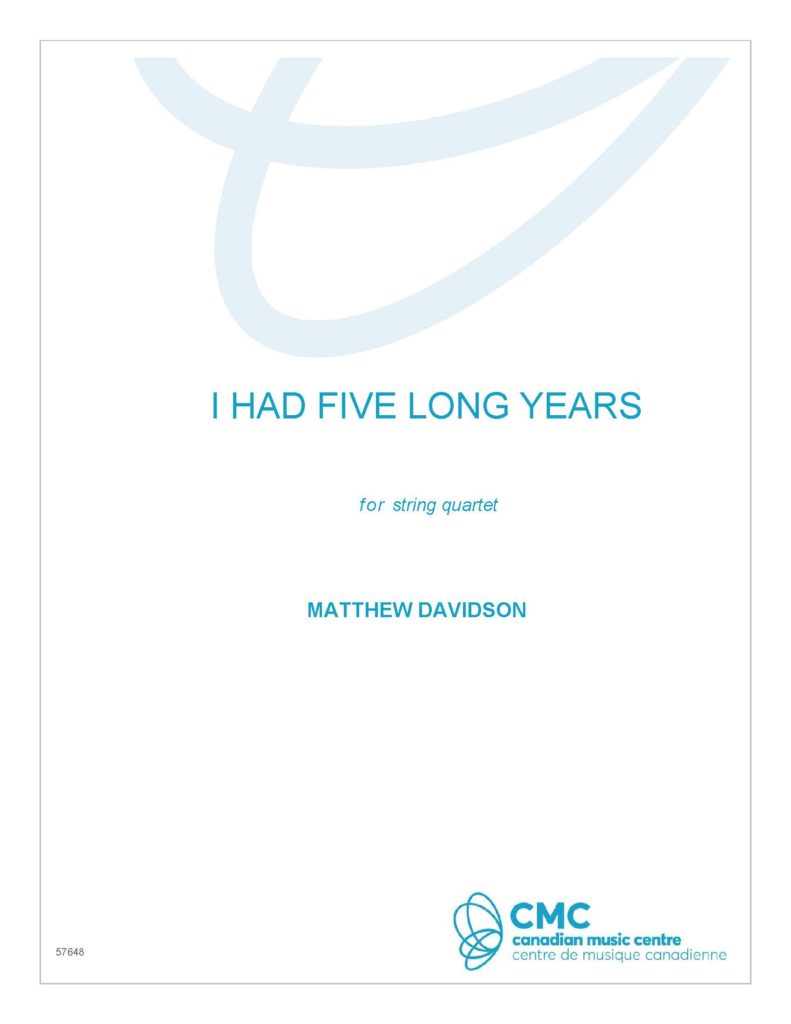I Had Five Long Years
for string quartet
This single movement work is structured as follows: Capital letters refer to themes, “var” refers to the different variations upon those themes. Although there is only one continuous movement, it is divided into three sections with the aforementioned contrasting variations. “A” is a transcription of a prison work song I had five long years recorded at the notorious Angola State Penitentiary in Louisiana in 1959 by Harry Oster (released on Folk-Lyric Recording Co., Louisiana Folklore Society). The original singer was James Russell and some other inmates. To appreciate the anguish and bitterness behind these prison songs, one must become familiar with the outrageous conditions to which inmates were subjected during its worst years. “B” is a transcription of the railroad song, John Henry as sung by Rich Amerson, a transient from Alabama as recorded by Harold Courlander in 1956 for Folkways Records. “I ain’t proud to be poor, but I ain’t too poor to be proud,” he was recorded as saying. Its treatment is also indicative of early jug band recordings of the 1920s which I enjoy. “C” is a transcription of the Bayou Teche Waltz as played by Columbus Fruge, a Cajun accordion player and singer recorded in the 1920s. As stated previously, each transcription is dealt with in a set of two variations. Variation 1 is a polytonal variation to be played exactly as written. Variation 2 is an optional improvised section which can either be played exactly as notated or partially as notated and/or completely improvised thereupon.
I HAD FIVE LONG YEARS (pour quatuor à cordes) (1991) Cette oeuvre n’a qu’un mouvement, est ce qui suit: A – variation1(a) – var2(a) – B – var1(b) – var2(b) – var2(c) – var1(c) – C Les lettres majuscules réfèrent aux mélodies, et « var » fait référence aux variations différentes sur les thèmes. Malgré le fait qu’il y ait un mouvement continu, il y a encore trois sections avec les variations que j’ai mentionnées antérieurement. « A » est une mélodie d’une chanson de travail en prison I HAD FIVE LONG YEARS, enregistrée en Angola State Penitentiary en Louisiane, une prison notoire pour les mauvais traitements infligés aux prisonniers, et à des conditions terribles. La mélodie a été enregistrée par Harry Oster (pour Folk-Lyric Recording Co., Louisiane Folklore Society) en 1959. « B » est un thème et la traduction d’une chanson folklorique, qui s’appelle « John Henry » comme elle a été chantée par Ralph Amerson, une personne sans abri d’Alabama qui a été enregistrée par Harold Courlander en 1956 pour Folkways Records. Il a dit « J’suis pas fier d’être pauvre, mais j’suis pas assez pauvre pour être fier». La traitement de la chanson est influencé par les anciens disques des années vingt de « Jug Bands » que j’adore. « C » est une traduction de la « Valse Bayou Teche » joué par Colombe Fruge, un accordéoniste et chanteur des années 1920s. Chaque première variation utilise la polytonalité, que l’on joue exactement comme je l’ai écrite. Chaque deuxième variation est une section improvisée (ou non) et joué exactement comme je l’ai écrite, ou on peut utiliser un peu d’improvisation.

